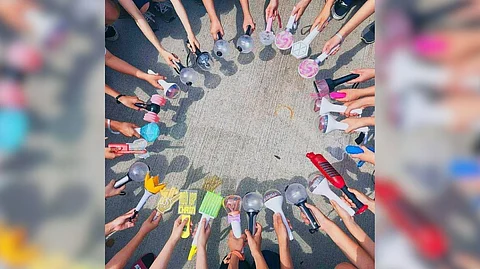
- NEWS
- the EDIT
- COMMENTARY
- BUSINESS
- LIFE
- SHOW
- ACTION
- GLOBAL GOALS
- SNAPS
- DYARYO TIRADA
- MORE

From international to local, across different genres and platforms, fandoms have become deeply embedded in the everyday lives of Filipinos. Whether it’s global sensations like BTS, or local icons like SB19, BINI, Donbelle and even popular content creators from TikTok and Youtube, fandom culture is present in nearly every online platform Gen Zs use. These communities or “fandoms” are not just groups of supporters, they are fans that invest their time, energy, emotion, even money, into their favorite personalities.
For a Gen Z individual who grew up in a digital world, being part of a fandom has become a norm. In many cases, it even serves as a conversation starter: “Are you a fan of this person or group?” “Who’s your bias?” These simple questions open doors to shared experiences and forming bonds. More than just a form of entertainment, fandom now becomes a way to express identity and find a sense of belongingness online. Through an increasingly digital world, anyone can now follow and support their favorite personalities through reacting and commenting, which helps fans feel more connected to their idols, bridging the gap that transcends distance.
This cultural phenomenon of fandoms is visible especially in shows like Pinoy Big Brother: Celebrity Collab Edition, where fandoms play an important role that shapes the outcome of the competition. In this show, celebrities and influencers are placed under the same roof, and fans become not just viewers, but active participants that hold the fate of the housemates. They spend money for votes, campaign, trend hashtags and flood social media with content to support their chosen housemates. It becomes more than just a reality program, but a battleground for fandoms.
With this level of engagement where fans are heavily invested emotionally — at what point does being a fan become too much?
Fandoms do not just influence the popularity of personalities, they also shape the perspectives and behaviors of the fans themselves. While it often begins as a joyful form of support and entertainment, they can sometimes give rise to negative and harmful behaviors.
In the case of PBB Collab Edition, fan behavior can escalate quickly — from healthy support to toxic competition. Fandoms don’t only influence who stays or gets evicted; they also shape narratives around the housemates which can be seen all over social media. While many fans uplift their idols, others resort to online bashing, or even blow personal attacks on rival contestants and their fans.
In the recent episode of Pinoy Big Brother: Celebrity Collab Edition, Robi Domingo, one of the hosts, once again reminded the ‘outside world’ that they do not tolerate spreading hate comments, especially threats to the safety of the housemates and their loved ones. This tells us that it is not limited to fandom rivalry. It shows how simple comments from fans and even non-fans could affect personalities themselves. This scene is not new, especially in the Korean pop culture, where fans could sometimes affect their own idols commenting on every aspect of their lives including their lovelife, clothing, physical appearance and even behavior. There are even cases when fans become so obsessed that they cross boundaries, and invade their private lives.
Despite those instances, fandoms can still be healthy. There are fandoms that create projects for a cause, such as fundraisers or donation drives–like the action of local fandoms such as A’TINs and PH EXO-Ls after Typhoon “Carina” hit in 2024 — allowing fans to have meaningful engagement through their collective action that goes beyond the internet and entertainment. This proves that fandoms can still be safe communities that’s built on respect, creativity and genuine support.
Fandoms and being part of it are not inherently bad. But, as internet and social media users, we Gen Zs should lead and shape digital fandom landscape, making a safer and mindful environment not just for our favorite artists, but to other individuals —whether a fan or not — as well.
